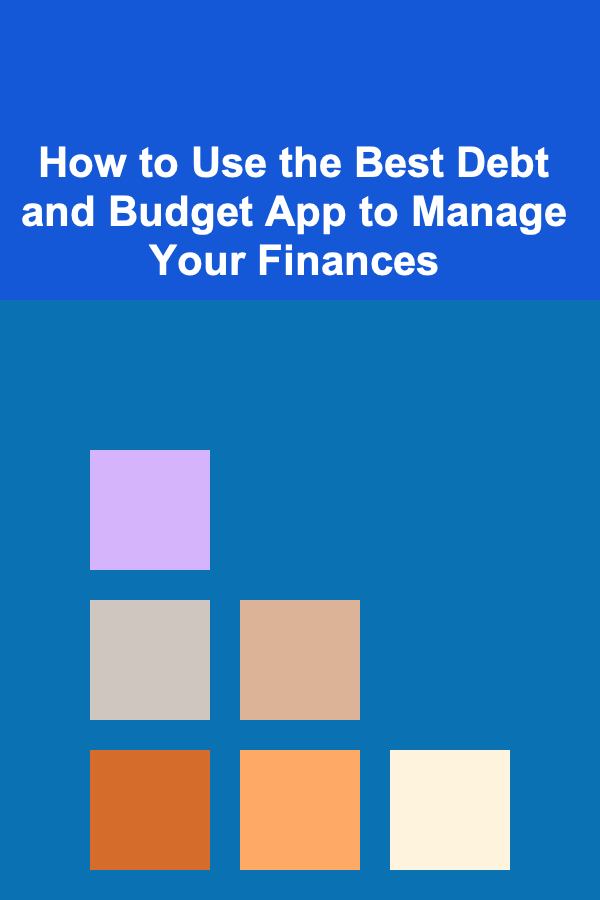
How to Use the Best Debt and Budget App to Manage Your Finances
ebook include PDF & Audio bundle (Micro Guide)
$12.99$7.99
Limited Time Offer! Order within the next:

Managing personal finances can be a daunting task, especially in today's fast-paced world where expenses often outpace income. Whether you're dealing with student loans, credit card debt, or simply trying to save for future goals, effective financial management is crucial. One of the most effective ways to streamline this process is by utilizing a debt and budget app. These applications not only help you track your income and expenses but also assist in managing debt and planning for future financial goals. This article will guide you on how to use the best debt and budget apps to manage your finances effectively.
Understanding Personal Finance Management
Before diving into specific apps, it's essential to understand what personal finance management involves. It encompasses budgeting, tracking expenses, managing debt, saving for goals, and planning for retirement. The primary objective is to ensure that you live within your means while preparing for future financial needs.
1. Importance of Budgeting
Budgeting is the foundation of financial management. It allows individuals to:
- Track Income and Expenses: Knowing how much money comes in and goes out is vital for making informed financial decisions.
- Set Financial Goals: Budgeting helps in setting realistic savings and debt repayment goals.
- Avoid Overspending: A well-planned budget can help prevent unnecessary expenditures.
- Increase Savings: By tracking spending habits, individuals can identify areas to cut back and boost savings.
2. Managing Debt Effectively
Debt management is another critical aspect of personal finance. Effective strategies include:
- Understanding Types of Debt: Recognizing the difference between secured and unsecured debt can inform repayment strategies.
- Prioritizing Payments: Choosing between methods like the snowball or avalanche approach helps in developing efficient repayment plans.
- Monitoring Credit Reports: Regularly checking credit reports can alert you to any errors or identity theft, helping maintain a healthy credit score.
Choosing the Right Debt and Budget App
With many options available, selecting the right app tailored to your needs is crucial. Some of the top-rated debt and budget apps include:
1. Mint
Mint is a comprehensive money management app that allows users to track their spending, create budgets, and manage debt all in one place.
- Key Features :
- Automatic transaction tracking
- Customizable budgets
- Credit score monitoring
- Bill reminders
Best For: Users looking for a free, user-friendly app with robust tracking features.
2. YNAB (You Need A Budget)
YNAB emphasizes proactive financial planning, encouraging users to allocate every dollar toward specific categories.
- Key Features :
- Zero-based budgeting approach
- Real-time updates
- Goal-setting capabilities
- Extensive educational resources
Best For: Individuals committed to changing their financial behaviors and willing to invest in their financial education.
3. EveryDollar
EveryDollar is known for its simplicity, allowing users to create monthly budgets quickly and easily.
- Key Features :
- User-friendly interface
- Customizable budget categories
- Option for manual or automated expense tracking (in premium version)
Best For: Users who want a straightforward budgeting solution without overwhelming features.
4. PocketGuard
PocketGuard simplifies budgeting by showing how much disposable income users have after accounting for bills and necessities.
- Key Features :
- "In My Pocket" feature for tracking discretionary spending
- Bill tracking and payment reminders
- Insights into spending habits
Best For: Individuals who want to focus on tracking disposable income.
5. GoodBudget
GoodBudget employs an envelope budgeting system that helps users allocate funds for different spending categories, including debt repayments.
- Key Features :
- Virtual envelopes for budgeting
- Synchronization across devices
- Ability to track debt payments
Best For: Those who enjoy the envelope budgeting method and prefer a visual representation of their budget.
6. Honeydue
Honeydue is a budgeting app specifically designed for couples, providing tools for tracking shared and individual expenses.
- Key Features :
- Shared account access
- Bill reminders and due date alerts
- Chat functionality for discussing finances
Best For: Couples seeking a dedicated app for managing shared finances.
Setting Up Your Chosen App
After selecting the right app for your needs, it's time to set it up. Here's a step-by-step guide to get started:
Step 1: Download and Install the App
Begin by downloading the app from the App Store or Google Play Store. After installation, follow these steps:
- Open the app and sign up using your email address.
- Create a secure password.
Step 2: Link Financial Accounts
Most budgeting apps allow you to link bank accounts, credit cards, and loans for automatic transaction tracking. Follow these steps:
- Navigate to the account linking section of the app.
- Select your financial institutions from the list provided.
- Enter your login credentials to establish a secure connection.
Linking accounts enables real-time tracking of income and expenses, providing a comprehensive view of your financial situation.
Step 3: Input Initial Financial Information
Next, input your initial financial data:
- Income Sources: List all sources of income, such as salaries, freelance work, and side jobs.
- Debts and Loans: Include details about existing debts, such as amounts owed, interest rates, and minimum monthly payments.
Step 4: Establish Your Budget Categories
Create categories that reflect your spending habits and financial goals. Common categories may include:
- Housing (rent/mortgage)
- Utilities (electricity, water)
- Transportation (gas, car payments)
- Groceries
- Entertainment
- Savings
- Debt repayments
It's essential to collaborate and ensure that both partners feel represented in category creation if using the app as a couple.
Step 5: Set Monthly Income Goals
Determine your monthly income goals based on your combined earnings or individual incomes. This figure serves as the foundation for your budget and guides how much money will be allocated to various categories.
Creating Your Budget
With the app set up, you can now create a budget that reflects your financial goals. Follow these steps:
Step 1: Review Monthly Income and Expenses
Start by reviewing your total monthly income against your anticipated expenses. This overview will help you identify how much money you have available for discretionary spending, savings, and debt repayment.
Step 2: Allocate Funds to Each Category
Allocate funds based on your priorities and past spending habits. Be realistic about what you need in each category and consider adjusting based on your financial goals.
- Example Budget Allocation :
- Housing: $1,500
- Utilities: $300
- Groceries: $400
- Transportation: $200
- Entertainment: $150
- Savings: $500
- Debt Repayment: $800
Step 3: Factor in Savings Goals
When creating your budget, it's equally important to incorporate savings goals. Determine how much you'd like to save each month and allocate those funds accordingly.
- Short-term Goals: Saving for vacations or larger purchases (e.g., a new appliance).
- Long-term Goals: Contributing to retirement accounts or building an emergency fund.
Step 4: Utilize the App's Tools
Take full advantage of the app's features to manage your budget effectively:
- Graphs and Charts: Visual representations can help you understand your spending patterns better.
- Alerts and Notifications: Set up notifications for bill payments, budget limits, and important reminders to stay accountable.
Tracking Your Expenses
Once your budget is established, the next critical step is tracking your expenses regularly. Here's how to do it effectively:
Step 1: Log Expenses Daily
Encourage daily logging of expenses to maintain awareness of spending habits. Most budgeting apps offer mobile interfaces for quick and easy entry.
- Tip: Make it a habit to check the app at the end of each day to enter transactions.
Step 2: Categorize Transactions
Ensure that all transactions are accurately categorized. Most apps automatically categorize expenses, but it's good practice to review them regularly and make adjustments as needed.
- Tip: If you notice frequent misclassifications, consider renaming categories or creating subcategories that better fit your spending habits.
Step 3: Review Your Budget Regularly
Set aside time at least once a month to review your budget together or individually. Assess how well you've stuck to your budget and identify areas for improvement.
- Discuss:
- What went well?
- Where did overspending occur?
- What changes can be made moving forward?
Regular reviews promote communication and enable adjustments to the budget as financial circumstances change.
Step 4: Adjust Your Budget as Needed
Life circumstances can change, requiring adjustments to the budget. If you experience a change in income, unexpected expenses, or shifts in financial goals, revisit your budget and make necessary modifications.
- Tip: Don't hesitate to make small tweaks; flexibility is key to maintaining a successful budgeting system.
Managing Debt Within Your Budget
Debt management is an integral part of your overall financial health. Here's how to effectively manage debt while using your budgeting app:
Step 1: Understand Your Debts
Begin by listing all debts, including:
- Credit cards
- Student loans
- Car loans
- Personal loans
Identify the interest rates, minimum payments, and remaining balances for each.
Step 2: Prioritize Debt Payments
Choose a debt repayment strategy that aligns with your financial goals and preferences:
- Debt Snowball Method: Focus on paying off the smallest debts first while making minimum payments on larger debts. This method creates momentum and motivation through quick wins.
- Debt Avalanche Method: Pay off debts with the highest interest rates first to minimize overall interest costs over time. This approach saves more money in the long run.
Step 3: Allocate Extra Funds Towards Debt
Whenever you have extra funds available, consider applying them to your highest-priority debt. This could come from surplus cash in your budget or additional income sources like tax refunds or bonuses.
- Tip: Use the "extra payment" feature in your budgeting app to track additional payments and see their impact on your debt balance.
Step 4: Set Clear Debt Payoff Goals
Establish specific timelines for paying off debts. This can include monthly targets or overall debt reduction goals.
- Example Goals :
- Pay off a specific credit card within three months.
- Eliminate student loan debt within five years.
Setting clear goals helps keep you motivated and accountable.
Step 5: Monitor Credit Scores
Keep an eye on your credit score regularly using the app's credit monitoring features. Understanding your credit score can inform your financial decisions and help you maintain good credit health.
- Tip: Look for aspects that affect your credit score, such as payment history, credit utilization, and length of credit history. Aim to improve your score by addressing these factors.
Utilizing Resources and Support
Step 1: Educate Yourself About Personal Finance
Invest time in learning about personal finance topics, including budgeting techniques, debt management strategies, and investment basics. Resources such as books, online courses, and podcasts can provide valuable insights.
Recommended Resources
-
Books:
- "The Total Money Makeover" by Dave Ramsey
- "Your Money or Your Life" by Vicki Robin
-
Online Courses:
- Coursera and Udemy offer finance-related courses that cover budgeting and investing.
-
Podcasts:
- "The Dave Ramsey Show"
- "BiggerPockets Money Podcast"
Step 2: Join Financial Communities
Consider joining online forums or local groups focused on personal finance. Platforms like Reddit's r/personalfinance or Facebook groups dedicated to budgeting provide support, encouragement, and practical tips from others facing similar challenges.
Benefits of Community Engagement
- Shared Experiences: Learn from others' successes and failures.
- Accountability: Share your progress and goals with peers to enhance accountability.
- Access to Resources: Gain insights into useful tools and tips.
Step 3: Work with a Financial Advisor
If you require personalized guidance, consider working with a certified financial advisor. They can provide tailored advice based on your financial situation and help develop a comprehensive plan for managing debt and budgeting.
When to Seek Professional Help
- If you're feeling overwhelmed with your financial situation.
- If you have complex financial needs or goals.
- If you're unsure about investment strategies.
Tracking Progress and Achievements
As you implement your budgeting and debt management strategies, it's essential to track your progress. Regularly assess how far you've come and celebrate achievements along the way.
1. Evaluate Your Financial Health
Set regular intervals (monthly or quarterly) to evaluate your overall financial health. Check metrics such as:
- Changes in net worth
- Reduction in debt levels
- Increase in savings
2. Celebrate Milestones
Celebrate significant milestones, whether achieving a savings goal or paying off a loan. Recognizing these accomplishments reinforces positive behavior and keeps you motivated.
- Ideas for Celebrations :
- Treat yourselves to a nice dinner.
- Plan a weekend getaway.
- Invest in a fun experience or activity.
3. Adjust Goals as Necessary
As you progress in managing your finances, don't hesitate to adjust your goals. Life changes, and your financial objectives may evolve as well. Regularly revisiting goals ensures they remain relevant and achievable.
Conclusion
Using a debt and budget app to manage your finances is a powerful tool for achieving financial stability and freedom. By understanding the importance of budgeting, selecting the right app, and following structured steps for setup and usage, you can take control of your financial journey.
Effectively tracking income and expenses, managing debt, and celebrating achievements fosters a healthier relationship with money. Remember that financial management is an ongoing process that requires commitment, education, and periodic adjustment.
By leveraging the features of the best debt and budget apps, you can pave the way for a brighter financial future filled with opportunities, security, and peace of mind. Start today by implementing these strategies, and watch your financial landscape transform!
Reading More From Our Other Websites
- [Home Maintenance 101] How to Maintain Your Home's Plumbing System for Long-Term Efficiency
- [Organization Tip 101] How to Create a Video Diary for Your Time Capsule
- [Organization Tip 101] How to Declutter Digital Files and Organize Your Computer
- [Organization Tip 101] How to Create a Decluttering Strategy for Large Workspaces
- [Organization Tip 101] How to Balance Short-Term and Long-Term Goals Effectively
- [Personal Care Tips 101] How to Revive Damaged Cuticles with Natural Oils
- [Organization Tip 101] How to Create a Mood Board for Inspiration in Your Space
- [Ziplining Tip 101] Gear Talk: Best Harnesses and Headsets for Ziplining -- An In-depth Review
- [Survival Kit 101] Top 10 Items for a Survival Kit with First Aid and Shelter
- [Home Pet Care 101] Dealing with Excessive Shedding in Pets

How to Stage Your Home's Outdoor Space for More Curb Appeal
Read More
How to Understand the Benefits of Lifelong Learning
Read More
How to Practice Walking Meditation
Read More
Protecting Your Business from Cyber Threats: A Comprehensive Guide
Read More
How to Train Your Cat to Stop Scratching Furniture: A Checklist
Read More
10 Tips for Aligning Corporate Communications with Business Strategy
Read MoreOther Products

How to Stage Your Home's Outdoor Space for More Curb Appeal
Read More
How to Understand the Benefits of Lifelong Learning
Read More
How to Practice Walking Meditation
Read More
Protecting Your Business from Cyber Threats: A Comprehensive Guide
Read More
How to Train Your Cat to Stop Scratching Furniture: A Checklist
Read More